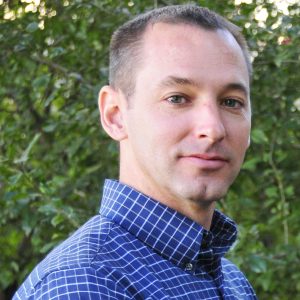Graduate Mentors

Feb. 26, 2018
Jon Simonsen
Educational background Ph.D., Agricultural and Extension Education, The Ohio State University, 2010 M.S., Agricultural and Extension Education, The Ohio State University, 2008 B.S., Agricultural Education, University of Nebraska – Lincoln, 1996 Courses taught Ag Ed Ld 1000: Orientation to Agricultural Education and Leadership Ag Ed Ld 3776: Litton Leadership Scholars Ag Ed Ld 4320/7320: Methods of Teaching I Ag Ed Ld 4993: Internship in Agricultural Education and Leadership Ag Ed Ld 8250: Leadership Theory and Application…

Feb. 26, 2018
Patrick Westhoff
Westhoff is the director of the Food and Agricultural Policy Research Institute (FAPRI) and a professor of agricultural and applied economics at the University of Missouri. He grew up on a small dairy and hog farm in northeast Iowa. After getting his undergraduate degree in political science from the University of Iowa, he served as Peace Corps volunteer in Guatemala. He has a master’s degree in Latin American Studies from the University of Texas and a Ph.D. in agricultural economics from Iowa State University. From 1992-1996, he was an economist with the U.S. Senate Committee on Agriculture, Nutrition and Forestry, where…

Feb. 5, 2018
Neil I. Fox
Educational background Post-graduate certificate in Learning and Teaching in Higher Education 2001, University of Salford Ph.D. 1998, University of Salford, Atmospheric Science M.Phil. 1995, University of Reading, Meteorology B.Sc. 1988, University of Manchester, Physics Courses taught ATMSC 2720: Weather Briefing ATMSC 4350: Mesoscale Meteorology and Dynamics ATMSC 4400: Micrometeorology ATMSC 4510: Remote Sensing for Atmospheric Science and Natural Resources ATMSC 4520: Environmental Biophysics ATMSC 4550: Physical Meteorology ATMSC 4590: Radar Meteorology ATMSC 8500: Radiation in the Atmosphere ATMSC 8550: Nowcasting ATMSC 9590: Advanced Radar Meteorology…

Jan. 10, 2018
Xi Xiong
Educational background Ph.D., Crop Science with an emphasis in Horticulture, Oklahoma State University…

Jan. 9, 2018
Kevin Bradley
Educational background Ph.D. Plant Pathology, Physiology, and Weed Science, Virginia Tech B.S. Agriculture, Ferrum College Courses taught PLNT_SCI 8420: Herbicide Mode of Action and Symptomology…

Dec. 15, 2017
Sonja A. Wilhelm Stanis
Educational background Ph.D., University of Minnesota Courses taught PRST 4250/7250: Parks, Health and Wellness PRST 8430: Social and Behavioral Research Methods PRST 2111: Park Planning and Design PRST 4340/7340: Recreation Land Management…

Dec. 15, 2017
Michael C. Stambaugh
Prior to becoming a scientist, Stambaugh worked as a forester for private industry and the federal government. Since 2010, his forestry research has received over $8 million in grant funding. He collaborates with the U.S. Forest Service, U.S. Fish & Wildlife Service, National Park Service, The Nature Conservancy, and multiple state natural resources organizations. He has been a National Geographic Explorer since 2010 and in 2023 was a Charles Bullard Fellow in Forest Research at Harvard Forest. Educational background Ph.D., University of Missouri Courses taught Forest Ecology Forest Health Advanced Forest Ecology…

Dec. 15, 2017
Craig P. Paukert
Paukert is the Leader of the US Geological Survey, Missouri Cooperative Fish and Wildlife Research Unit in the School of Natural Resources. His research is in collaboration with state and federal agencies to help them with their research needs related to climate change adaptation strategies for fish and fisheries, conservation and management of large river fishes, and stream fish conservation at the local and landscape scale. Paukert has a Ph.D. from South Dakota State University, an M.S. from Oklahoma State University, and a B.S. From the University of Minnesota. Prior to arriving at MU in 2010, he worked with USGS…

Nov. 14, 2017
Noel R. Aloysius
Noel Aloysius’ research and teaching focus on terrestrial hydrology, watershed biophysical processes and environmental informatics. Noel’s research group investigates how climate and weather, landscapes and land management drive precipitation-runoff processes and fate and transport of pollution at field-, watershed- and continental-scale river basins. His group utilizes field observations, long-term hydro-climate data, numerical and statistical models to examine the movement of water, solutes and sediments in response to environmental change and human management. Noel is a member of the Gulf Hypoxia Task Force SERA-46 research group representing the University of Missouri. The SERA-46 group is a consortium of twelve Land Grant…

Nov. 10, 2017
Jared E. Decker
IDENTIFYING LOCI RESPONDING TO SELECTIONIn 2012 Decker published a method, now called Generation-Proxy Selection Mapping, to identify loci responding to current selection. In this analysis, birth date (as a surrogate to generation number) is fit as the dependent variable in a mixed model equation. Variants that have changed in frequency rapidly due to selection are strongly associated with birth date, thus the method identifies regions under selection. The mixed model equations correct for demography, relatedness, and population structure within the data. We have previously used this method in Angus cattle using approximately 45,000 SNPs. In 2021, Decker’s group published…